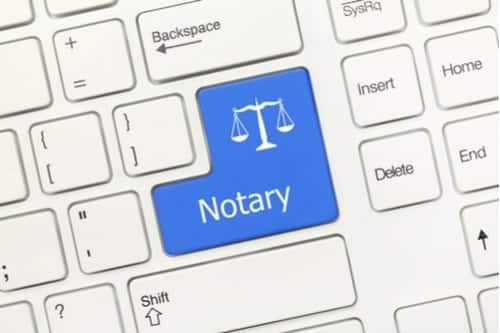
By Joshua J. Strickland
Associate
The Ohio Notary Public Modernization Act
What You Need to Know
At the end of 2018, Ohio enacted Senate Bill 263, the Ohio Notary Public Modernization Act which authorized online or electronic notarizations and made sweeping changes to the way that Ohio authorizes its notaries and the way notaries undertake their work.
The electronic notarization will not begin until September 18, 2019, but other changes take effect as early as March 2019.
Until September and until the Ohio Secretary of State licenses specific electronic notaries, electronic or remote notarization of documents is not permitted.
Electronic/Remote Notaries:
SB 263 provides that the Ohio Secretary of State may license a resident of Ohio who is already a duly appointed and commissioned notary public to perform notarizations online using live video links, electronic signatures and electronic notary seals.
Geographical Restrictions
The new law states that an online notary public may perform online notarizations only if the online notary public (i) is a resident of Ohio and (ii) is located within the geographical boundaries in Ohio at the time of the online notarization.
A/V Technology
Online notarization will require two-way video and audio conference technology allowing each party to see and hear the other. The Secretary of State will set the standards for this, but it will probably utilize technology already in use by companies in other states where electronic notaries are already allowed such as Nevada.
Qualifications & Requirements
Ohio electronic notaries will be required to maintain electronic journals with details of all online notarizations. Those journals must be deposited with the Secretary of State on the expiration of the online notary public’s authorization or their death. This will require advance planning by the notary. In addition to the notary public’s application to be appointed and commissioned as a notary generally, the electronic notary public must successfully complete an educational course, pass a specific test, pay a fee of not more than $150, and pass a criminal background check. There may also be a continuing education requirement.
Traditional Notaries:
In order for an individual (who is not an Ohio licensed attorney) to qualify to be appointed and commissioned as a notary public, the individual must:
(i) be at least eighteen (18) years old;
(ii) be a legal resident of Ohio;
(iii) completed an educational program;
(iv) passed a written test;
(v) passed a criminal background check (not more than six months old), and
(vi) paid a fee not to exceed $150.00.
Ohio attorneys not yet notaries as of the law’s effective date will be required to take the education course and pay a fee but not submit a background check or take a test.
For those current non-attorney notaries whose existing commission expires after March 18, 2019, those notaries will not be renewed unless the notary submits a criminal background check required of a new notary, a renewal application, and a fee not to exceed $60.00. A non-attorney notary public may apply to renew his or her commission beginning three (3) months prior to the expiration date of his or her notary commission.
Procedures:
Over the next six (6) months or so the Secretary of State will be adopting forms for the notary applications, education requirements, tests, and rules for traditional and online notaries.
In many places around Ohio, the notary education course and testing will be done by the same groups that do them currently, bar associations in many places. All online notarizations, including the educational course, testing requirements, and approval process will be handled directly by the Secretary of State.
Other Changes:
The new notary law also makes a number of changes to existing law.
- First, the notary fee is increasing for the first time in years to $5.00 per notarized document (not per signature).
- Second, it standardizes the acknowledgment/jurat language that must be on notarized documents.
- Third, it provides more flexibility on the size of notary seals and pre-printed stamps.
- Fourth, it defines in clear terms the situations where a notary cannot notarize a document.
- Finally, all notaries will be registered with the Secretary of State and searchable in an online database rather than registered at the County level as currently done.
The information presented in this post is not legal advice and does not form a lawyer/client relationship. Laws and circumstances can differ and change.
Please contact us for a personal review of your situation






